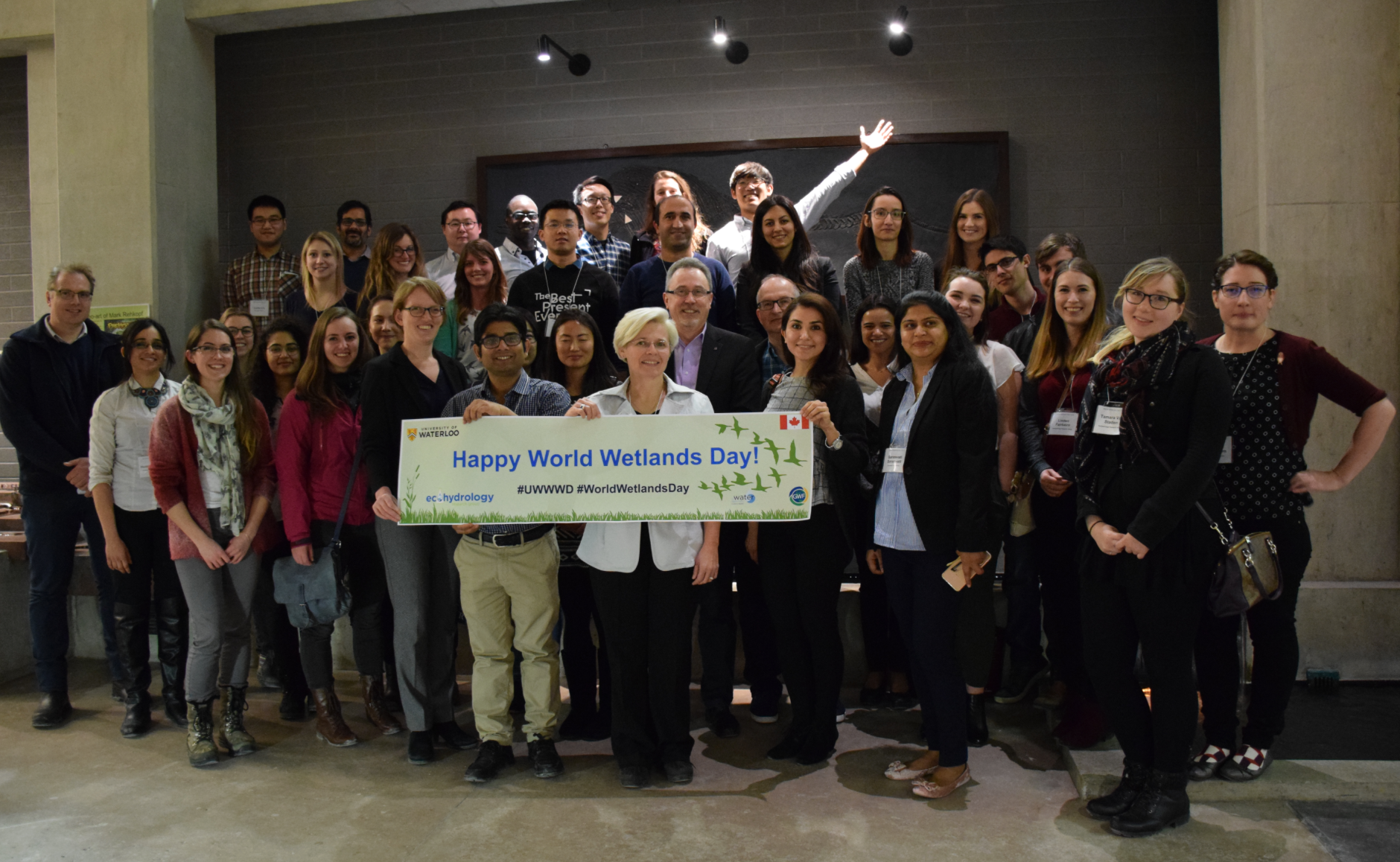On Friday February 2nd, 2018, the Ecohydrology Research Group hosted the University of Waterloo’s sixth annual World Wetlands Day (WWD) celebration.
The Event
The celebrations included a research symposium, a poster presentation session, and a keynote public lecture. The event's program is available online.
Nearly 100 people attended the research symposium, with attendees from Wilfrid Laurier University, Athabasca University, the University of Windsor, and more. Throughout the symposium, researchers from various disciplines highlighted their research relating to wetlands. The symposium featured three-minute student presentations, which challenged students to summarize their work in a short time frame.
The poster presentation session that followed the oral presentations featured a total of twenty-six posters showcasing research related to wetlands, with presenters ranging from undergraduate students to post-doctoral fellows. Two $150 prizes were awarded for the best student poster presentations. Danyka Byrnes, with her poster titled "Nutrient Legacies and Time Lags in Eastern U.S. and Southern Ontario", won in the graduate student category. Ana Kostic, with her poster titled "Impact of Linear Disturbances on Peatland Methane Exchange", took the prize in the undergraduate student category.

Finally, the keynote public lecture was delivered by the Director of University of Michigan’s Water Center, Dr. Jennifer Read. The lecture, titled "Impactful Science Along our Coasts: Supporting and assessing user-focused research in our estuaries, coastal wetlands and Great Lakes," was attended by over sixty people. A recording of the lecture will be available for viewing on our YouTube page soon.
Overall, the event was a great success. We look forward to organizing next year’s celebrations.
For more information on the event, please read the post written by Tatjana Milojevic on the University of Waterloo’s home page.
Acknowledgements
We would like to thank Philippe Van Cappellen, Christina Smeaton, Fereidoun Rezanezhad, Chris Parsons, Bhaleka Persaud, Tatjana Milojevic, Megan Jordan, Allie Dusome, Heather Neufeld, and the entire Ecohydrology team for their help in organizing the day’s events.
A special thank you to the Science Communications team and the Water Institute for promoting the event.
Speakers
-
Bruce
MacVicar,
Civil
and
Environmental
Engineering
Urban streams are a drag: Cumulative impacts of floods on sediment transport and benthic invertebrates in Southern Ontario -
Zahra
Akbarzadeh,
Earth
and
Environmental
Sciences
Damming modifies the global nitrogen cycle along the land to ocean continuum -
Saraswati
Saraswati,
Geography
and
Environmental
Management
Impact of access roads on GHGs emission from boreal peatlands -
Elise
Devoie,
Civil
and
Environmental
Engineering
Wetlands in transition: the impacts of permafrost degradation in peatland-dominated watersheds -
Wynona
Klemt, Biology
Flood-prone lakes as archives of natural and anthropogenic trace metal deposition in the Alberta oil sands - Serghei Bocaniov, Earth and Environmental Sciences
- Water and nutrient retention in wetland-linked aquatic ecosystems: Insights from a three-dimensional model of Lake St. Clair (USA-Canada)
-
Jody
Daniel,
Biology
Drivers of prairie pothole permanence class -
Matt
Elmes,
Geography
and
Environmental
Management
Hydrogeological connectivity of a moderate-rich fen watershed in the Athabasca Oil Sands Area of the Western Boreal Plain, northern Alberta
Poster Presentations
- Idorenyin Harrison - Pesticide Absorption from Water Using Biochars
- Chinyere Hannah Dickson - World and Land Relationship
- Heather Polowyk - Where Are They Now? The Bent Spike-Rush Story
- Sarah Yuckin - Invasive Phragmites autralis Affects Wetland Primary Production and Decomposition
- Hyumin (Danny) Oh - Effect of Freeze-Thaw Cycles on the Exchange of Gases from Sphagnum Peat Soils: A Physical Process View on Mechanisms
- Danielle Gunsch - Variation in 24-Hour Dissolved-Oxygen Profiles Along Elevation Gradients in Coastal Wet Meadows Relative to Vegetation Density and Agricultural Stress
- Matt Coulas - Soil Organic Matter Decomposition: Tea and Litter Bag Analysis of a Constructed Fen in Northern Alberta
- Lu Huang - Internal Loading of Nutrient Si in Lentic Freshwater Systems: Unravelling the Dominant Mechanisms
- Md Abdus Sabur - Internal Phosphorus Loading: Role of Dissolved Silicate in Oxic and Anoxic Conditions
- Danyka Byrnes - Nutrient Legacies and Time Lags in Eastern U.S. and Southern Ontario
- Frederick Cheng - Biogeochemical Hotspots: Role of Small Wetlands in Landscape Nutrient Processing
- Patricia Crisan Szabo - Environmental Change and Mental Health
- Stephanie Slowinski - Predicting Energetic Limitations to Subsurface Microbial Growth for Mixotrophic Metabolisms
- Dulguun Maidar - Social-Ecological Regime Shift
- Hameet Singh - Social-Ecological Regime Shifts and the Governance of Community-Managed Marine Protected Areas: Implications for Ecological Conservation and Community Well-Being
- Simar Kaur - Understanding Social-Ecological Regime Shift Through the Lens of Slow and Fast Variables
- Ana Kostic - Impact of Linear Disturbances on Peatland Methane Exchange
- Heather Townsend - Effects of Freezing and Thawing Cycles on Soil Solute Transport Properties
- Izabela Jasiak - Reconstructing Past Hydrological Conditions and Contaminant Deposition in the Peace-Athabasca Delta, Alberta
- Linden Fairbairn - Reactive Interfaces in Agroecosystems
- Tamara Van Staden - Legacies of Agricultural Pollutants (LEAP)
- Geertje Pronk - Depth Dependent Microbial Carbon Use Efficiency in the Capillary Fringe as Affected by Water Table Fluctuations in a Column Incubation Experiment
- Matthew Pereira Wilson - Remote Sensing of Great Lakes
- Colin McCarter - Influence of Anisotropy, Anion Sorption, and Degree of Decomposition on Solute Transport in Peat
- Lichu Lin - Social-Ecological Regime Shift in China
- Samantha King - Using a Gendered Lens to Examine Social-Ecological Regime Shifts Within Coastal Fishing Communities